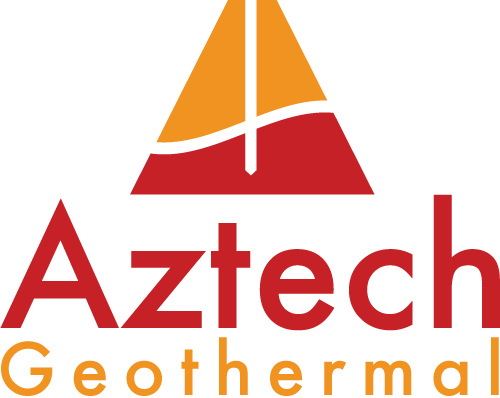Formation Thermal Conductivity Testing

Aztech Geothermal offers on-site Formation Thermal Conductivity Testing, analysis, and report generation to support large system design. The ground heat exchanger design needs to be consistent with the site geology and the heating and cooling loads of the building. It’s acceptable to estimate the thermal conductivity for smaller systems and to produce budget estimates. For larger systems an actual measurement of the thermal properties of the ground will ensure an effective ground heat exchanger design.
Thermal Conductivity Testing Service
Larger projects often call for a Formation Thermal Conductivity Test – sometimes simply called Thermal Conductivity Test or a Test Bore to measure the thermal properties of the ground at the project site. Aztech has equipment and trained personnel to perform Thermal Conductivity Testing if required by engineers and/or to meet NYS Clean Heat Rebate eligibility criteria. We most commonly provide Thermal Conductivity Testing as a turn-key service with the installation of the test bore, testing and report generation included as a package. Aztech has a strong network of geothermal drilling subcontractors under master services agreements and selects drillers based on their proximity to the project (local geological knowledge is valuable!), availability and pricing.
Typical Scope of Work: Drilling of Test Bore and Thermal Conductivity Testing
To improve the accuracy of the Ground Heat Exchanger (GHX) design a test bore will determine the actual formation thermal conductivity and diffusivity values of the site. Major subtasks related to the Thermal Conductivity Testing include:
The Test Bore: Drilling / Looping / Grouting
-
- Based on the borehole depth established as the “basis of design” to support a building or network, a representative borehole will be drilled and used to determine both the drilling conditions and thermal properties of the on-site geology.
- A drilling subcontractor will be hired to install the test bore at your project location. In New York most boreholes are under 500 feet in depth while Massachusetts allows deeper geothermal boreholes.
- Often a mud pit will be dug to contain drill cuttings and any ground water. If ground water is produced in excess of 50 GPM, Aztech will discuss with the client the most effective way to manage the water on the site, which may include additional charges.
- Drilling subcontractor will set up 4-foot-high orange construction fencing around the impacted area and will place straw for erosion control onto the impacted area brought back to rough grade.
- The geothermal pipe is typically 1.25-inch or 1.50-inch diameter HDPE with factory fused U-bend. The “loop” is inserted to the bottom of the borehole after the drilled depth is achieved.
- A non-permeable, thermally enhanced grout, typically in the range of 1.2 to 1.6 conductivity, will seal the HDPE pipes in the borehole. The grout is a way to guarantee a thermal connection of the geothermal pipes to the borehole and avoid communication of different layers of the local aquifer along its depth (i.e., groundwater protection).
- Pipes will be sealed on completion and remain above grade unless instructed otherwise which would be part of the optional site restoration.
Thermal Conductivity Testing / Test Report
-
- After a minimum of a 5-day waiting period after the borehole is complete, Aztech will mobilize to the site.
- The GeoCube testing equipment will be attached to ground loop piping & operate the internal electric boiler and circulator powered with 40kW supporting generator, Data will be collected for 48 hours at 2-minute intervals.
- Aztech uses the data collected on site and an AEE Certified GeoExchange Designer (CGD) oversees the analysis of the Test Report. A complete Test Report will include:
- Measurement of Undisturbed Formation Temperature, calculation of Formation Thermal Conductivity, and an estimate of Average Formation Diffusivity.
- Drilling log with information at various depths with formation type encountered, any voids and estimates of ground water yield. Also included will be information about the drilling technology, specific rig and drill bits used along with the rate of drilling with any comments about break downs or other inefficiencies experienced.
- Record of the amount of grout used and estimates of formation loss from what was anticipated.
Contact us to inquire about Thermal Conductivity Testing and our extensive geothermal heat pump design and support services.
Meet Our Team →

Affiliations →

Latest News →
Aztech Supports Another Successful NY-GEO 2024 Spring Conference
Aztech Geothermal played a key role in selecting and delivering strong educational content and general conference operations at the NY-GEO 2024 Spring Conference in Albany, New York. Continue




